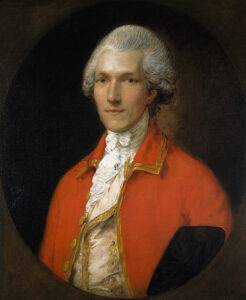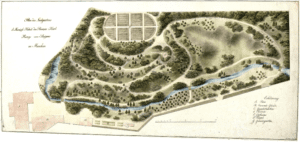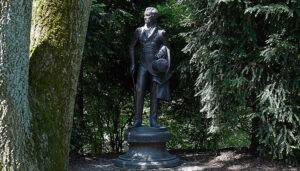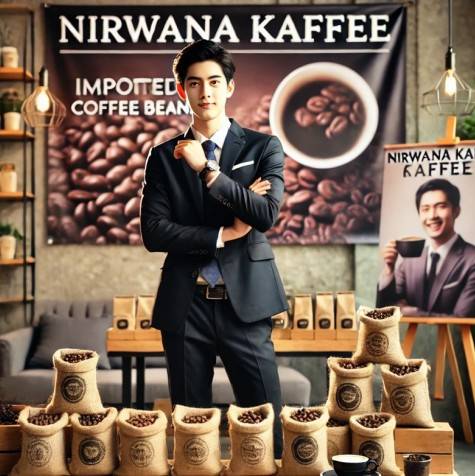
Meet Abhinav, the Newest Member of Our Admissions Team!
24. May 2024
Project Week: The Magic Ingredient of Employment: CV & Cover Letter
17. June 2024First of all, please let me thank you for the kind birthday wishes I received. It was overwhelming to receive so many messages. Thank YOU!
As a thank you for your generosity, I am sharing some secrets about my hometown Munich with you.
Born and partially raised in Munich, I am what colloquially is called in Bavarian dialect a “Münchner Kindl” – a Munich child. Funnily enough, the lower coat of arms of Munich is a child holding a book and rumors have it that Amazon’s Jeff Bezos decided to name the Kindle after a visit to the Oktoberfest in Munich. Please take note, this is an unverified but highly probable rumor.

Being born in Munich means belonging to an exclusive minority as approximately only a one third of Munich’s 1.6 million citizens are born in Munich. This possibly also explains the wily sense of humor of the citizens of Munich (Münchener) in that the Oktoberfest starts in September and ends on the first Sunday in October. The simple explanation being that the evenings in October are already cold and so in 1872 the Oktoberfest was moved to September. The first Oktoberfest was in October 1810, so it only took them 62 years to realize that the weather is better in September, and on a side note, beer was only allowed to be sold from 1880 onwards.
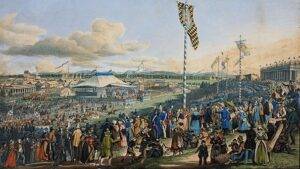 Picture Copyright Bayerischer Rundfunk
Picture Copyright Bayerischer Rundfunk
So the first Oktoberfest was held in 1810 as a celebration of the royal wedding between Crown Prince Ludwig and Princess Therese, with the citizens of Munich invited to join the festivities. For the entertainment, it featured a gigantic horse race, which until now explains the oval form of the “Wiesn” as the area where the Oktoberfest takes place is called. The western side still being elevated as this where the stands were to watch the races. It was such a success that it evolved into an important agricultural show into a grand annual festival celebrating Bavarian culture, featuring beer tents, traditional foods, and l music. Today, it stands as a testament to Bavarian tradition, drawing millions of visitors from around the world to partake in the camaraderie and cheer. (And rinses into the city’s coffers about € 1,250,000,00 – yep, that is 1.25 billion Euros – in 16 days.)
One of my favorite secrets about Munich is that in part its success was thanks to an US American in the later 18th Century which initiated the military, economic and infrastructure reforms needed for Munich to transform from being a poor agricultural city to becoming a modern city – Benjamin Thompson or as Munich calls him Count Rumford. Born in Woburn, Massachusetts to humble farmers, thanks to his talent in natural sciences he attended lectures in Harvard, married a rich older widow, worked probably as a spy for the British in the American Revolutionary War, after the took his money, left his family and moved to London and started a career in the British military and as a scientist. From Great Britain he came to Munich in 1785 and impressed the ruler of Bavaria that he ended being the personal consultant of the regent.
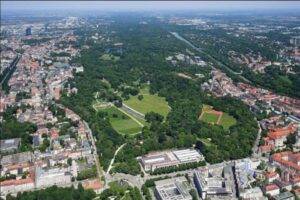 Picture Copyright: Caster Steger
Picture Copyright: Caster Steger
Lord Rumford, the Bavarian American aristocrat, not only created the English Garden in Munich, the world’s largest park in a city, he researched on insulating military uniforms and underwear against the cold, but the most important part of his work was as a social reformer. He established workhouses for the poor, invented an energy saving oven and developed the Rumford Soup, which was an easy and cheap to produce but a very nutritious soup to feed the poor. With this soup he also manifested the potato in the diet of the Bavarians, which had been very sceptic of this American import.
My final secret that I am sharing with you today is the tiny and hidden air-conditioned park of Munich. Literally in the heart of Munich, about a 7-minute walk from the city center, Marienplatz, lies a park that everyone oversees – the official and old name is “Finanzgarten” (finance garden), the new name is “Dichtergarten” (poet’s garden). This garden has many secrets for you to discover, if you are in Munich or if you visit, but my favorite part of this garden is that the tree foliage ensures that in the summer time the park always stays cool, even on the hottest summer days, so if you must be in the city on one of those steaming days, just take a stroll through the park to cool down and relax. The sweet part, you will be alone, as this park is enchanted, and most people cannot or don’t deserve to see it. 😉
Sharing is caring and I hope that me sharing these little secrets about Munich relays my gratitude for all the birthday wishes I received.
Wishing you an inspired and productive month ahead.
Sending you my best Bavarian Regards,
Or as we say in Munich “Servus”,
Sascha Liebhardt


